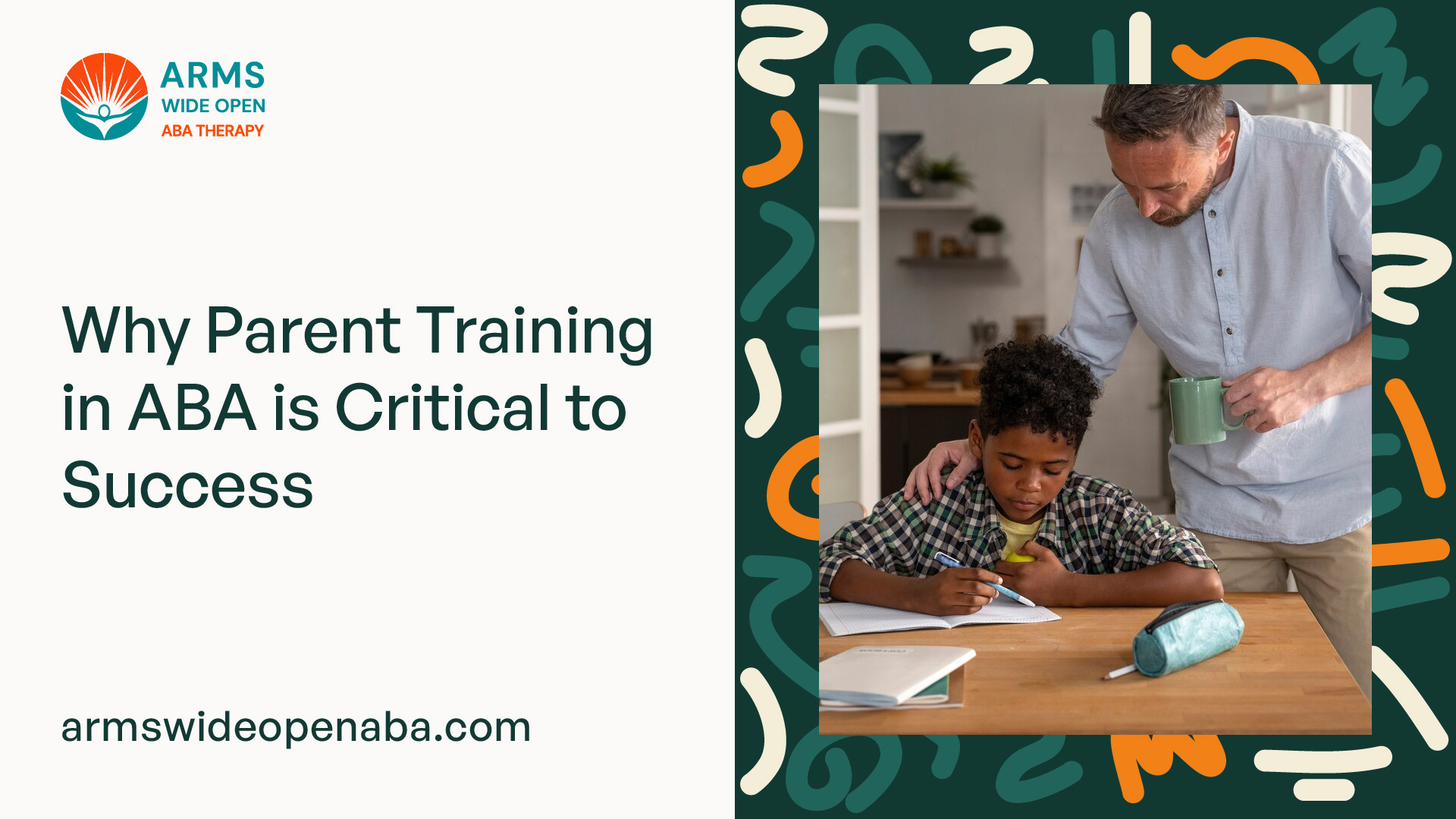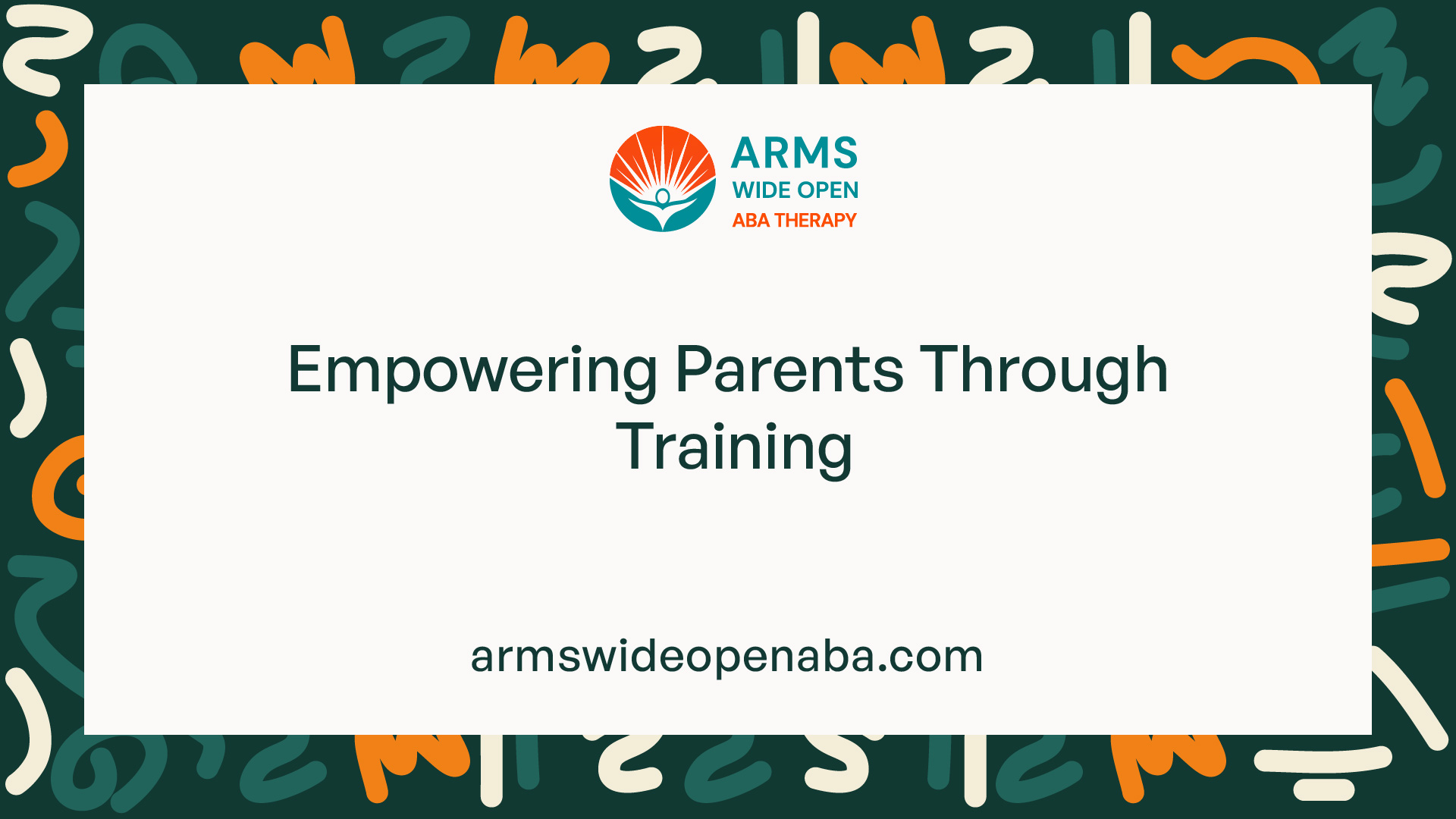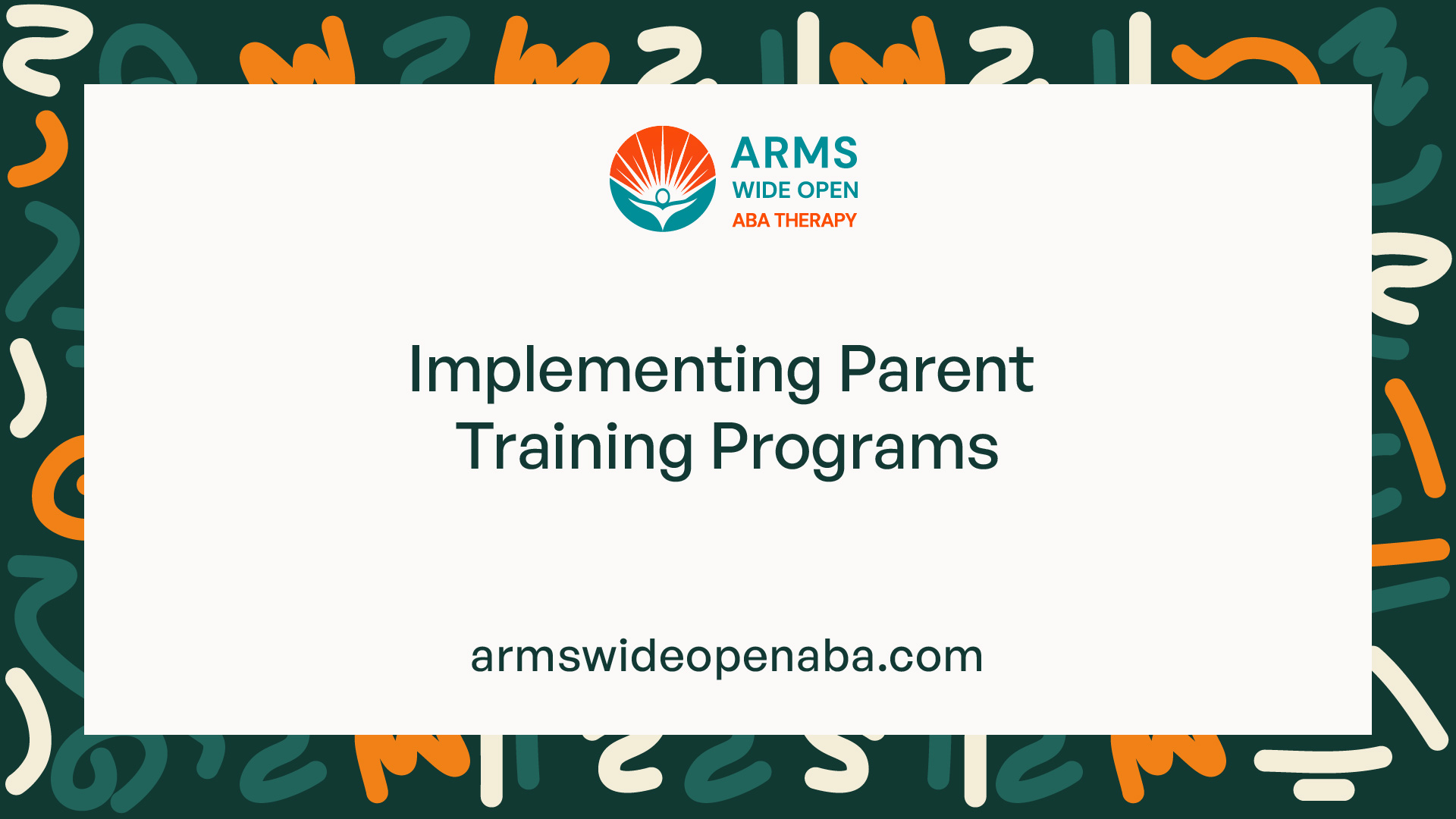Why Parent Training in ABA is Critical to Success
Unlock ABA success with critical parent training! Discover why it's the superpower for effective therapy.


Understanding ABA and Parent Training
To fully comprehend the critical role of parent training in ABA success, it is essential to first understand Applied Behavior Analysis (ABA) and the significance of parent involvement in ABA therapy.
Introduction to Applied Behavior Analysis (ABA)
Applied Behavior Analysis (ABA) is a scientific approach that focuses on understanding and modifying behavior. It is widely recognized as an effective intervention for individuals with autism spectrum disorder (ASD) and other developmental disabilities. ABA therapy utilizes evidence-based techniques to teach new skills, reduce problem behaviors, and enhance overall quality of life.
ABA is based on the principles of learning theory, emphasizing the use of positive reinforcement and systematic prompting strategies. Through careful observation and data collection, behavior analysts analyze the antecedents and consequences that influence behavior. This analysis allows them to develop individualized intervention plans tailored to the unique needs of each individual.
Importance of Parent Training in ABA Therapy
Parent training plays a crucial role in the success of ABA therapy. Parents are an integral part of their child's life and are in the best position to support their child's progress beyond therapy sessions. By actively participating in the intervention process, parents become empowered advocates for their child's development and well-being.
The benefits of parent training in ABA therapy are numerous. Firstly, it equips parents with the necessary skills to implement ABA techniques consistently at home. This consistency helps reinforce the skills learned during therapy sessions, leading to more effective and efficient progress. Additionally, as parents become familiar with ABA principles and strategies, they can proactively address their child's challenging behaviors and support the development of new skills.
Furthermore, parent training promotes generalization of skills beyond the therapy setting. Children with ASD often struggle with applying learned skills in various environments. However, when parents are trained in ABA techniques, they can create opportunities for their child to practice and generalize skills in real-life situations. This generalization enhances the child's overall independence and functional abilities.
Lastly, parent training in ABA therapy strengthens the parent-child relationship. By actively participating in their child's therapy, parents become more attuned to their child's needs and preferences. This increased understanding fosters a stronger bond and promotes effective communication between parents and their child.
In summary, parent training is a vital component of ABA therapy. It empowers parents to become active participants in their child's progress, facilitating consistent implementation of ABA techniques, promoting generalization of skills, and strengthening the parent-child relationship. Through parent training, families can unleash the superpower within themselves to support their child's growth and success.

Empowering Parents Through Training
In the realm of Applied Behavior Analysis (ABA), parent training plays a pivotal role in ensuring the success of therapy. By empowering parents with the necessary skills and knowledge, they become active participants in their child's progress. This section will explore two key aspects of parent training in ABA: building parental skills and confidence, and enhancing communication between parents and therapists.
Building Parental Skills and Confidence
Parent training programs aim to equip parents with the skills and techniques needed to effectively implement ABA strategies at home. By learning these techniques, parents become proficient in reinforcing positive behaviors and addressing challenging behaviors in their child. This not only promotes consistency in the application of ABA principles but also empowers parents to play an active role in their child's development.
Through parent training, parents gain valuable insights into their child's unique needs and learning style. They learn how to break down complex tasks into smaller, manageable steps, making it easier for their child to learn and succeed. As parents develop their skills, they become more confident in their ability to support their child's progress and navigate challenging situations.
Enhancing Communication Between Parents and Therapists
Effective communication between parents and therapists is paramount in ensuring the success of ABA therapy. Parent training programs emphasize the importance of open and ongoing communication. Regular meetings and discussions provide an opportunity for parents to share observations, concerns, and progress updates with the therapist. Likewise, therapists can provide guidance, answer questions, and collaborate with parents to develop individualized strategies.
By fostering a strong partnership between parents and therapists, the child receives consistent support and intervention across different settings. Therapists can gain valuable insights into the child's behavior and progress at home, enabling them to tailor therapy sessions to address specific needs and goals. This collaborative approach strengthens the overall effectiveness of ABA therapy and maximizes the child's potential for growth.
Engaging in parent training not only benefits the child but also empowers parents to actively participate in their child's therapy journey. By building parental skills and confidence and enhancing communication between parents and therapists, parent training plays a critical role in the success of ABA therapy. It promotes consistency, generalization of skills beyond therapy sessions, and fosters a strong parent-child relationship rooted in understanding and support.
Benefits of Parent Training in ABA
Parent training plays a critical role in the success of Applied Behavior Analysis (ABA) therapy. By empowering parents with the necessary skills and knowledge, they become active participants in their child's therapy journey. Let's explore the benefits of parent training in ABA therapy.
Consistency in Therapy Techniques
One of the key benefits of parent training in ABA is the promotion of consistency in therapy techniques. When parents are trained in ABA strategies and interventions, they can implement them consistently at home. This consistency allows for the reinforcement of skills learned during therapy sessions, leading to more effective progress. By using the same techniques as the therapists, parents create a cohesive and supportive environment for their child's development.
Generalization of Skills Beyond Therapy Sessions
Another crucial benefit of parent training in ABA is the generalization of skills beyond therapy sessions. ABA therapy focuses on teaching functional skills that can be applied in real-life situations. When parents are trained, they can facilitate the generalization of these skills in various settings, such as at home, school, or in the community. This generalization helps the child to transfer and use their learned skills in different contexts, enhancing their overall independence and success.
To illustrate the impact of generalization, here are some examples of skills that can be generalized:

Strengthening Parent-Child Relationship
Parent training in ABA not only benefits the child but also strengthens the parent-child relationship. Through training, parents gain a deeper understanding of their child's needs, preferences, and communication styles. This understanding fosters empathy and promotes a more positive and supportive relationship between parents and their child. Additionally, as parents learn effective behavior management techniques, they can create a nurturing and structured environment that promotes their child's growth and well-being.
By recognizing the benefits of parent training in ABA, it becomes evident that involving parents in the therapy process is crucial for achieving optimal outcomes. Consistency in therapy techniques, generalization of skills, and the strengthening of the parent-child relationship all contribute to the success of ABA therapy and the overall development of the child.

Implementing Parent Training Programs
To ensure the success of Applied Behavior Analysis (ABA) therapy, it is crucial to implement effective parent training programs. These programs empower parents with the necessary skills and knowledge to support their child's progress and generalize skills learned in therapy beyond the therapy sessions. Let's explore the components of effective parent training programs and strategies for their successful implementation.
Components of Effective Parent Training Programs
Effective parent training programs in ABA therapy typically consist of several key components. These components are designed to equip parents with the tools and techniques to effectively implement ABA strategies at home. Some common components include:
- Education and Information: Parents are provided with a comprehensive understanding of ABA principles and techniques. This includes information about the goals of therapy, behavior management strategies, and reinforcement techniques.
- Hands-On Training: Parents engage in practical training sessions where they have the opportunity to practice ABA techniques under the guidance of trained professionals. These sessions help parents develop the necessary skills to implement ABA strategies effectively.
- Individualized Support: Parent training programs should be tailored to meet the specific needs of each family. This individualized approach helps parents address their unique challenges and develop personalized strategies for supporting their child's progress.
- Collaboration and Communication: Effective parent training programs promote open lines of communication between parents and therapists. Regular meetings and progress updates allow for ongoing collaboration, ensuring that parents feel supported and have the opportunity to discuss any concerns or questions they may have.
Strategies for Successful Implementation
Successful implementation of parent training programs requires careful planning and support. Here are some strategies to maximize the effectiveness of these programs:
- Clear Expectations: Clearly communicate the objectives and goals of the parent training program to parents. Provide them with a clear understanding of what is expected of them during the training process and how their involvement will positively impact their child's progress.
- Flexibility and Accessibility: Recognize that each family has unique circumstances and commitments. Offer flexible training options, such as in-person sessions, online resources, or virtual training, to accommodate various schedules and preferences.
- Ongoing Support: Ensure that parents have access to ongoing support from therapists and trainers throughout the training program. This support can be in the form of regular check-ins, Q&A sessions, or a dedicated helpline for questions and concerns.
- Reinforcement and Positive Feedback: Recognize and reinforce parents' efforts and progress in implementing ABA strategies at home. Positive feedback and encouragement go a long way in motivating parents to continue their active involvement in their child's therapy.
By implementing parent training programs that include these essential components and strategies, ABA therapy can be more effective and impactful for children with developmental challenges. Empowering parents with the knowledge and skills to support their child's progress not only enhances the therapy experience but also strengthens the parent-child relationship and promotes consistency in implementing ABA techniques.
Overcoming Challenges in Parent Training
While parent training plays a critical role in the success of Applied Behavior Analysis (ABA) therapy, there are challenges that may arise along the way. Addressing these barriers to participation and providing support for parents in applying ABA techniques at home are essential for ensuring the effectiveness of parent training programs.
Addressing Barriers to Participation
Parents may face various barriers that can hinder their participation in ABA parent training programs. These barriers can include time constraints, financial limitations, lack of knowledge about ABA, and emotional stress. It is crucial for therapists and ABA professionals to address these barriers to encourage and facilitate parental involvement.
To address time constraints, parent training programs can be flexible in terms of scheduling sessions. Offering different time slots or providing online resources and materials can help accommodate parents' busy schedules. Financial limitations can be addressed by providing affordable or subsidized training options, as well as connecting parents with available resources and funding sources.
Educating parents about the benefits and importance of ABA can help alleviate their lack of knowledge. Providing informational materials, hosting workshops, and offering one-on-one consultations can empower parents with the information they need to fully engage in their child's therapy.
Emotional stress can be a significant barrier for parents. ABA professionals should create a supportive and empathetic environment, acknowledging the challenges parents may face and providing emotional support when needed. Offering counseling services or connecting parents with support groups can also be beneficial.
Supporting Parents in Applying ABA Techniques at Home
One of the goals of parent training in ABA is to encourage parents to apply ABA techniques outside of therapy sessions, promoting generalization of skills and consistency in the child's environment. However, parents may encounter difficulties in implementing these techniques at home. Providing ongoing support and guidance is crucial to help parents effectively apply ABA techniques.
ABA professionals can offer regular follow-up sessions or check-ins to address any questions or concerns parents may have. These sessions can provide an opportunity to review techniques, troubleshoot challenges, and offer additional guidance tailored to the specific needs of the child and family.
In addition to direct support, providing parents with resources and materials can enhance their ability to apply ABA techniques at home. This can include visual aids, written instructions, video demonstrations, and access to online platforms or mobile applications that offer guidance and reinforcement of ABA principles.
Collaboration between parents and therapists is vital for successful implementation of ABA techniques at home. Open lines of communication should be established, allowing parents to share their experiences, seek guidance, and provide feedback. Regular meetings or progress reports can help track the child's progress and facilitate ongoing collaboration between parents and therapists.
By addressing barriers to participation and providing ongoing support, parent training programs in ABA can overcome challenges and empower parents to effectively apply ABA techniques in the home environment. This collaborative approach ultimately enhances the success of ABA therapy and strengthens the overall development and well-being of the child.
Sources
https://behavioral-innovations.com/blog/importance-of-parent-training-aba-therapy/
https://www.handscenter.com/the-importance-of-parent-training-in-aba-therapy
Similar articles
We’re here to help you

Our team is here to assist you in this process. Contact us for any assistance.
it’s easy to apply
We Accept Most Insurances
Our in-network insurance partnerships make ABA therapy more accessible to families throughout our service areas.







Our Insurance Process
We'll request your insurance details to help us verify your plan's coverage for ABA therapy. Once we've received this information, we'll walk you through your benefits, including copayments, deductibles and out-of-pocket maximums, so you know what to expect in advance.
Our team will then handle the preauthorization and all the necessary paperwork.
.svg)





















.jpeg)


































.jpeg)




.jpeg)







.jpeg)











.jpeg)
















